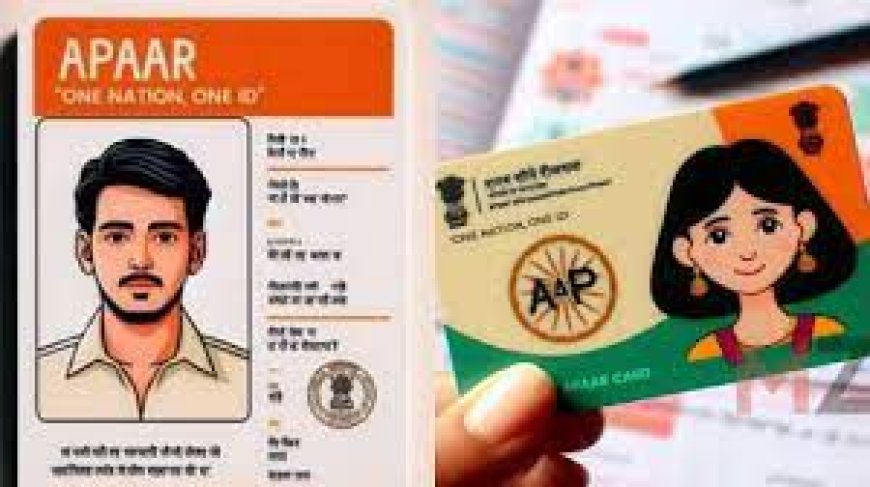‘One Nation – One Student ID’: Unravelling APAAR

NEP (2020) & APAAR:
Any Nation's Educational System and Policies are based on two concrete pillars: Innovation and Improvisation. The creation and execution of the New Education Policy in 2020 is a significant step in that direction.
The National Education Policy (NEP) 2020 provides an extensive framework for advancing education in India. By 2030, it seeks to guarantee all students, from pre-kindergarten through higher education, access to high-quality education. Students' movement from schools and colleges between states and cities and the availability of resources such as training programs, scholarships, fellowships, and online learning courses are typical problems that many students in India confront. Not to mention the drawn-out procedures for submitting documents, keeping track of records, and adhering to various policies at various universities, colleges, and other establishments. Thus, one of the main NEP initiatives is the establishment of APAAR (Automated Permanent Academic Account Registry), which aims to alleviate and overcome these issues that students and their parents face. It reduces the possibility of fraudulent activities on both sides by serving as a one-stop shop for all verified information and academic records. As mentioned, it also pushes colleges, universities, and other establishments to adhere to a standard protocol and procedure structure.
For students attending private or public schools or universities in India, APAAR ID is a digital ID card. The Ministry of Education started it to give each student in India's schools a unique ID number. All students will benefit from the APAAR ID, also called the "One Nation - One Student ID Card," since all their academic information, including awards, degrees, scholarships, and other credits, will be digitally transferred to the ID.
The Objective:
The purpose of the APAAR ID card is to give students internet access to and collection of their academic credits, degrees, and other data. For students, it is a permanent identifier that records, in one location, their academic accomplishments and progress from pre-kindergarten through higher education. The card will be connected to the student's Aadhaar ID, but it won't take its place or be usable in any other way. The pupils will receive an APAAR card and their current Aadhaar ID. The student's academic path and accomplishments will be tracked by the APAAR number, which will also facilitate easier school transfers. This step was taken to streamline the transfer and migration procedures without requiring laborious, lengthy paperwork.
The APAAR ID is a big step in giving students a well-organized and easily accessible academic experience. Credential verification, obtaining government advantages like scholarships and other services, and transferring between colleges and institutions will all be made simpler by this.
The Highlights:
The following are some ways that the open and simple structure of the APAAR ID program can help both students and state administration systems nationwide.
Simple school-to-university transfers: Students will find it simpler to move between schools and universities with the APAAR ID card while maintaining their academic standing and accomplishments. Additionally, it simplifies providing various sets of targeted papers to application or admission locations.
Credential verification made more accessible: By offering a single digital platform for all academic data, the APAAR ID card will make it easier to validate a student's academic credentials, including degrees, scholarships, and other credits. The amount of administrative labour that schools and colleges must perform to maintain massive files and physical documentation for every student has been reduced. Additionally, by storing information digitally, there is less chance of fraudulent paperwork and unapproved transactions occurring when students are admitted or transferred.
Unique identification number: From pre-primary through higher education, a student's academic progress and accomplishments are tracked by a unique identity number provided by the APAAR ID card. This facilitates tracking a student's development and achievements by colleges and universities.
Access to government benefits: Students with an APAAR ID card will find it simpler to apply for scholarships and other government programs that require documentation of their academic background.
Decrease in unethical conduct: The APAAR ID promotes transparency in the student's records and allows minimal room for dishonesty during the admissions or transfer processes. Additionally, this removes the chance that crucial documents may be lost or misplaced after submission.
A student's APAAR ID is associated with the ABC (Academic Bank of Credits), an online collection created in collaboration with the National Academic Depository (NAD). The National Credit Framework (NCrF), which is in charge of crediting all learning outcomes, adds academic credits to the ABC whenever they are created and uploaded by educational institutions, at the end of a semester, after an entire academic year, or on any other occasion. Access to academic information and verification will be quick and easy because the ABC data is recognized as official on a national level.
The Union Ministry of Education (MoE) has recently informed state governments and UTs to implement APAAR ID to expedite the process. To ensure authenticity and safe storage, all registered educational institutions must obtain parental agreements and save their students' diplomas and awards in the digital locker.
The Conclusion:
It's no secret that the APAAR ID scheme's policy-making process is deliberate and well-organized. This act allows governments and educational institutions to track enrollment and dropout rates, which can be viewed as a driver for positive change. On the other hand, parents and students have expressed some privacy concerns regarding the potential exposure of their data to outside parties. Except for the approved organizations that oversee administration in schools and universities, the government has guaranteed strong secrecy of information without improper use or interference from other parties. Therefore, the APAAR ID can be beneficial in improving the nation's educational system, simplifying complex processes for students, and eliminating any questionable or dishonest practices.












































